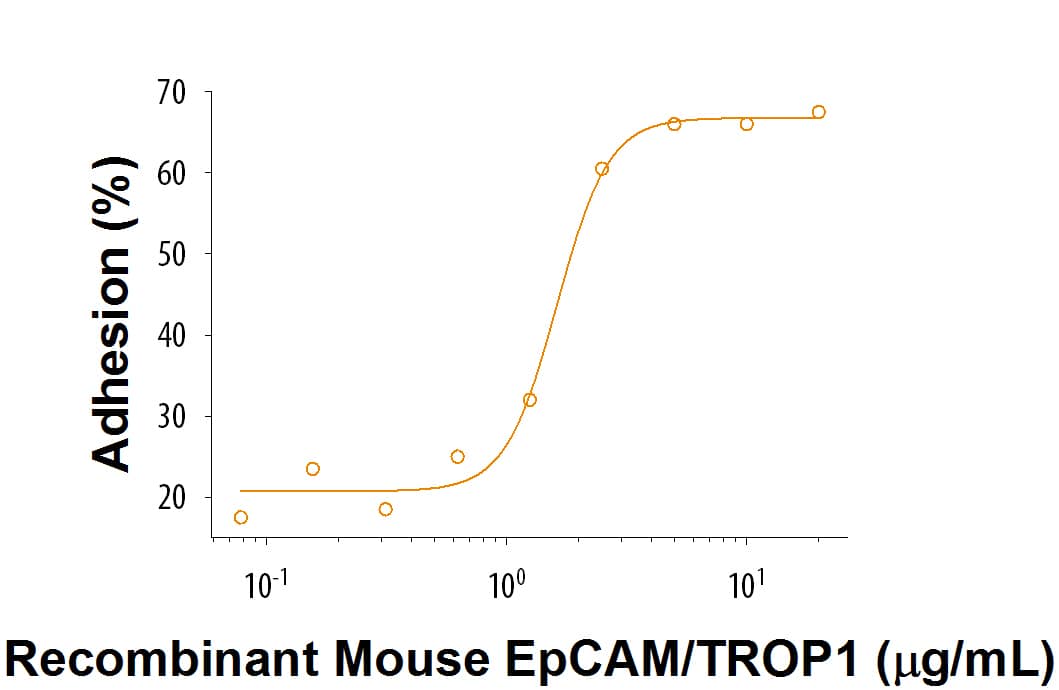Recombinant Mouse EpCAM/TROP1 Fc Chimera Protein, CF
R&D Systems, part of Bio-Techne | Catalog # 9364-EP

Key Product Details
Source
NS0
Accession #
Structure / Form
Disulfide-linked homodimer
Conjugate
Unconjugated
Applications
Bioactivity
Product Specifications
Source
Mouse myeloma cell line, NS0-derived mouse EpCAM/TROP1 protein
| Mouse EpCAM/TROP1 (Gln24 & Arg81-Thr266) Accession # Q99JW5 |
IEGRMDP | Mouse IgG2a (Glu98-Lys330) |
| N-terminus | C-terminus |
Purity
>95%, by SDS-PAGE visualized with Silver Staining and quantitative densitometry by Coomassie® Blue Staining.
Endotoxin Level
<0.10 EU per 1 μg of the protein by the LAL method.
N-terminal Sequence Analysis
Arg81 detected. Gln24 inferred from enzymatic pyroglutamate treatment revealing Arg25
Predicted Molecular Mass
55 kDa
SDS-PAGE
58-75 kDa and 8 kDa
Activity
Measured by the ability of the immobilized protein to support the adhesion of the L Cells mouse fibroblast cell line.
When 5 x 104 cells/well are added to Recombinant Mouse EpCAM/TROP-1 and Human Fibronectin (0.5 μg/mL, Catalog # 1918-FN) coated plates, cell adhesion is enhanced in a dose dependent manner. The ED50 for this effect is 0.4-2.4 μg/mL
When 5 x 104 cells/well are added to Recombinant Mouse EpCAM/TROP-1 and Human Fibronectin (0.5 μg/mL, Catalog # 1918-FN) coated plates, cell adhesion is enhanced in a dose dependent manner. The ED50 for this effect is 0.4-2.4 μg/mL
Scientific Data Images for Recombinant Mouse EpCAM/TROP1 Fc Chimera Protein, CF
Recombinant Mouse EpCAM/TROP1 Fc Chimera Protein Bioactivity
Immobilized Recombinant Mouse EpCAM/TROP1 (Catalog # 9364-EP) enhances L Cells mouse fibroblasts adhesion in the presence of Human Fibronectin (Catalog # 1918-FN). The ED50 for this effect is 0.4-2.4 µg/mL.Formulation, Preparation and Storage
9364-EP
| Formulation | Lyophilized from a 0.2 μm filtered solution in PBS. |
| Reconstitution |
Reconstitute at 500 μg/mL in PBS.
|
| Shipping | The product is shipped at ambient temperature. Upon receipt, store it immediately at the temperature recommended below. |
| Stability & Storage | Use a manual defrost freezer and avoid repeated freeze-thaw cycles.
|
Background: EpCAM/TROP1
References
- Balzar, M. et al. (1999) J. Mol. Med. 77:699.
- Keisuke, N. et al. (2009) PLoS One 4 :e8543
- Litvinov, S.V. et al. (1994) J. Cell Biol. 125:437.
- Balzar, M. et al. (2001) Mol. Cell. Biol. 21:2570.
- González, B. et al. (2009) Stem Cells, 27: 1782.
- Went, P. et al. (2006) Br. J. Cancer 94:128.
- Spizzo, G.S. et al. (2002) Int. J. Cancer 98:883.
Long Name
Epithelial Cell Adhesion Molecule
Alternate Names
17-1A, CD326, GA733-2, gp40, KS1/4, M4S1, TACSTD1, TROP1
Gene Symbol
EPCAM
UniProt
Additional EpCAM/TROP1 Products
Product Documents for Recombinant Mouse EpCAM/TROP1 Fc Chimera Protein, CF
Product Specific Notices for Recombinant Mouse EpCAM/TROP1 Fc Chimera Protein, CF
For research use only
